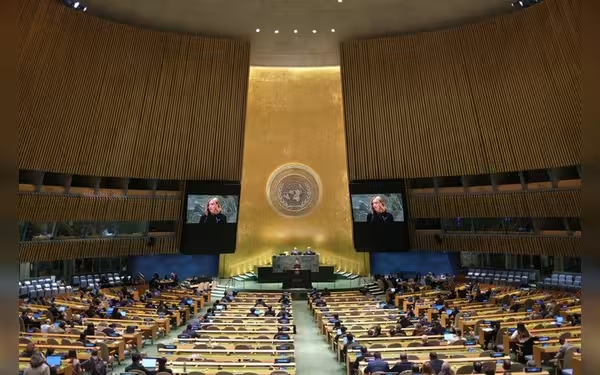Saturday, November 16, 2024 07:32 PM
Urgent Call for UN Reform Amid Middle East Violence
- Over 500 lives lost in recent Middle East conflict.
- UN's effectiveness questioned amid ongoing global crises.
- Humanitarian crisis escalates with 2 billion in conflict zones.
 Image Credits: thefrontierpost
Image Credits: thefrontierpostThe recent violence in the Middle East underscores the urgent need for UN reform to address global law and order breakdown.
The recent escalation of violence in the Middle East, particularly the massive bombing campaign by Israel against Hezbollah in Lebanon, has cast a dark shadow over the opening of the 79th UN General Assembly in New York. In just the first 24 hours of this conflict, over 500 lives were lost, and hundreds more were injured. This tragic backdrop highlights the urgent need for a reformed United Nations to address the growing breakdown of law and order globally.
As the world grapples with multiple crises, the risk of an all-out war in the Middle East looms large. The international order appears to be faltering, with trust among major powers at an all-time low. We find ourselves in a divided world, where Western nations and their allies stand on one side, while Russia and several countries in the so-called global majority, including China, occupy the other. This division complicates diplomatic efforts, as the UN seems increasingly ineffective in mediating conflicts like those between Israel and Hezbollah.
Efforts to broker peace in Lebanon are uncertain, especially given the UN's failure to achieve a ceasefire in Gaza over the past 11 months. The UN, despite its vital work through various agencies, is perceived as becoming irrelevant due to its inability to effectively orchestrate peace. The last significant global collaboration to resolve a crisis occurred during the financial meltdown of 2008, primarily led by the G20, with the UN playing a supporting role.
Two key events in recent history have further eroded trust in the UN. The first was the 2011 Libyan revolution, where a UN resolution authorized force to protect civilians, leading to the downfall of Muammar Qaddafi's regime. Russia viewed this as a betrayal, feeling cheated by the West's actions. The second was the UN's failure to present a united front against the Syrian regime, despite clear evidence of chemical weapon use against civilians. These failures have contributed to a growing skepticism about the UN's effectiveness.
UN Secretary-General Antonio Guterres recently warned that the world is becoming increasingly unsustainable due to impunity, inequality, and uncertainty. He emphasized that geopolitical divisions, ongoing wars, climate change, and nuclear threats are pushing humanity toward a precarious situation. The conflict in Gaza, along with the Iran-backed “axis of resistance” in Lebanon, Iraq, Yemen, and Syria, further complicates the quest for peace.
Moreover, the humanitarian crisis continues to escalate, with around 2 billion people living in conflict-affected areas. Many of these individuals seek refuge in more stable countries, often becoming a burden and contributing to instability. The recent "Summit of the Future" held before the UNGA meetings failed to provide a binding solution to pressing global issues such as climate change and women's rights, leaving many to wonder if it will simply gather dust in the UN archives.
However, there is still hope. As the world faces increasing discord, it is crucial to revisit the essence of the UN Charter, established nearly 80 years ago. The principles of "right makes might" that were once central to the UN's mission seem to have been overshadowed by a return to the idea of "might makes right." For the UN to regain its role as a force for good, world leaders must renew their trust in the organization as a means to ensure peace rather than merely discussing it.
The current state of global affairs calls for a reevaluation of the UN's role in maintaining peace and order. As we witness a decline in the world order, it is imperative that we advocate for a more effective international body capable of addressing the challenges of our time. Only through collective action and renewed commitment can we hope to avert the catastrophic consequences of ongoing conflicts and build a more stable future for all.













